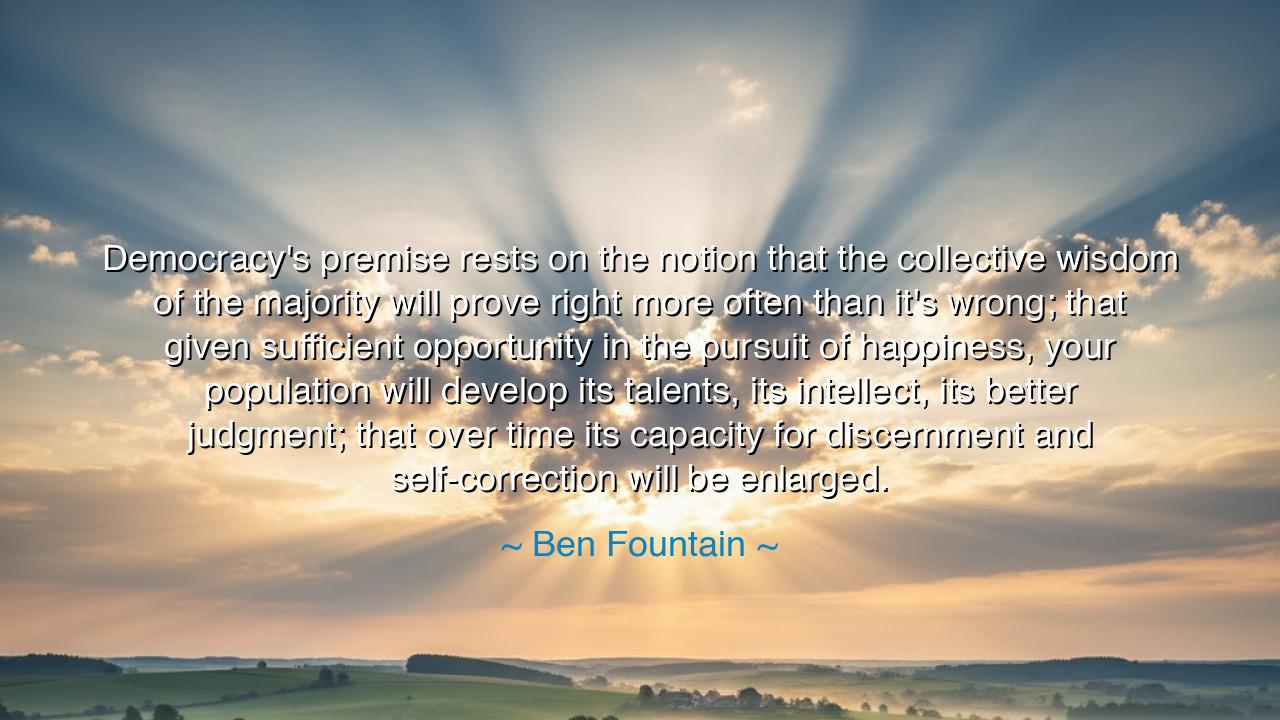
Democracy's premise rests on the notion that the collective
Democracy's premise rests on the notion that the collective wisdom of the majority will prove right more often than it's wrong; that given sufficient opportunity in the pursuit of happiness, your population will develop its talents, its intellect, its better judgment; that over time its capacity for discernment and self-correction will be enlarged.






The modern philosopher and novelist Ben Fountain once wrote words that echo the deepest foundations of civilization: “Democracy’s premise rests on the notion that the collective wisdom of the majority will prove right more often than it’s wrong; that given sufficient opportunity in the pursuit of happiness, your population will develop its talents, its intellect, its better judgment; that over time its capacity for discernment and self-correction will be enlarged.” These words are not mere commentary on government — they are a meditation on the faith of humanity itself. For in them lies a truth as ancient as the first assembly of free men and women: that liberty is not the gift of perfection, but the practice of learning, erring, and growing together.
At the heart of Fountain’s quote lies the sacred premise of democracy — that though individuals may falter, the many, when given freedom and time, will rise toward wisdom. This idea was not born in the modern age but in the bright cradle of Athens, where citizens once gathered to speak and decide not through fear, but through reason. They believed, as Fountain does, that the collective judgment of free people, guided by dialogue and experience, will lean toward truth more often than tyranny or ignorance will. Democracy, then, is not built upon the certainty of human wisdom, but upon the enduring hope that humanity can learn to govern itself with justice and understanding.
Yet Fountain’s words also carry a solemn awareness — that this vision depends on opportunity. He reminds us that for the people’s wisdom to grow, they must be free to seek their own pursuit of happiness. Where poverty, prejudice, or fear reign, the soil of democracy cannot nourish intellect or virtue. A population deprived of education or dignity cannot fulfill this promise of discernment. Thus, democracy is not a machine that runs by itself; it is a living organism that must be fed by fairness, knowledge, and compassion. Only then can its capacity for self-correction mature through the trials of time.
History gives proof to this truth. In the early days of the American republic, the ideal of democracy was proclaimed, but not yet complete. Millions were denied voice and freedom — women, the enslaved, the poor. Yet through centuries of struggle, the people themselves, guided by the better judgment of conscience, expanded the circle of liberty. Each generation corrected the errors of the last: abolition, suffrage, civil rights — all born from the slow awakening of a people’s collective wisdom. This is what Fountain means when he says democracy’s capacity for self-correction is enlarged over time. Freedom refines itself through the moral courage of its citizens.
The same story has unfolded in nations across the world — where once kings ruled by decree, and now parliaments and assemblies echo with the voices of the people. In India, after long years of colonial subjugation, democracy rose like dawn over a billion hearts. It was not perfect, but it was alive. And in that imperfection lay its power — for it gave its citizens the chance to become wiser, to stumble and stand again, to learn that liberty must be renewed with every generation. Democracy endures not because people are infallible, but because they possess the sacred ability to grow beyond their own mistakes.
Fountain’s insight reminds us, too, that faith in democracy is faith in humanity itself. It demands patience — to believe that education will sharpen minds, that freedom will refine morality, and that time will temper passion into understanding. This faith is not naive optimism; it is the courage to see that, though the path of the people may wind through darkness, it bends always toward light. To despair of democracy is to despair of our own potential for growth and goodness.
Let every listener, then, take this wisdom to heart: participate, do not withdraw. For democracy lives through the voice and conscience of its citizens. Seek truth, not noise; discernment, not division. Educate yourself and others, for ignorance is the enemy of self-correction. Speak, but also listen, for in the harmony of disagreement lies the wisdom of the whole. Fountain’s teaching is clear: democracy is not a finished temple, but a workshop — forever under construction, shaped by the hands and hearts of its people.
Thus, as the ancients might have said, the glory of democracy is not that it is perfect, but that it believes in the perfectibility of man. Its strength lies not in the will of the few, but in the awakening of the many. And so, may every generation remember Ben Fountain’s truth — that through freedom, education, and compassion, the collective heart of humanity grows wiser, its light brighter, and its capacity for self-correction ever greater, until the dream of justice stands not as an ideal, but as a living reality.






AAdministratorAdministrator
Welcome, honored guests. Please leave a comment, we will respond soon